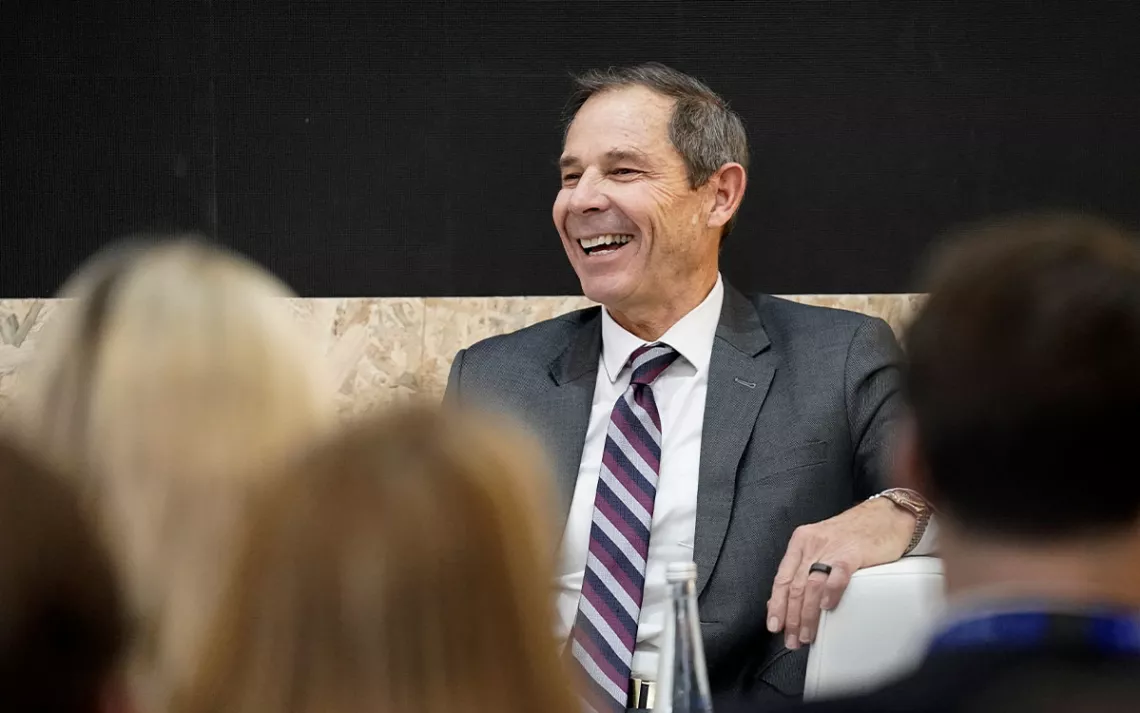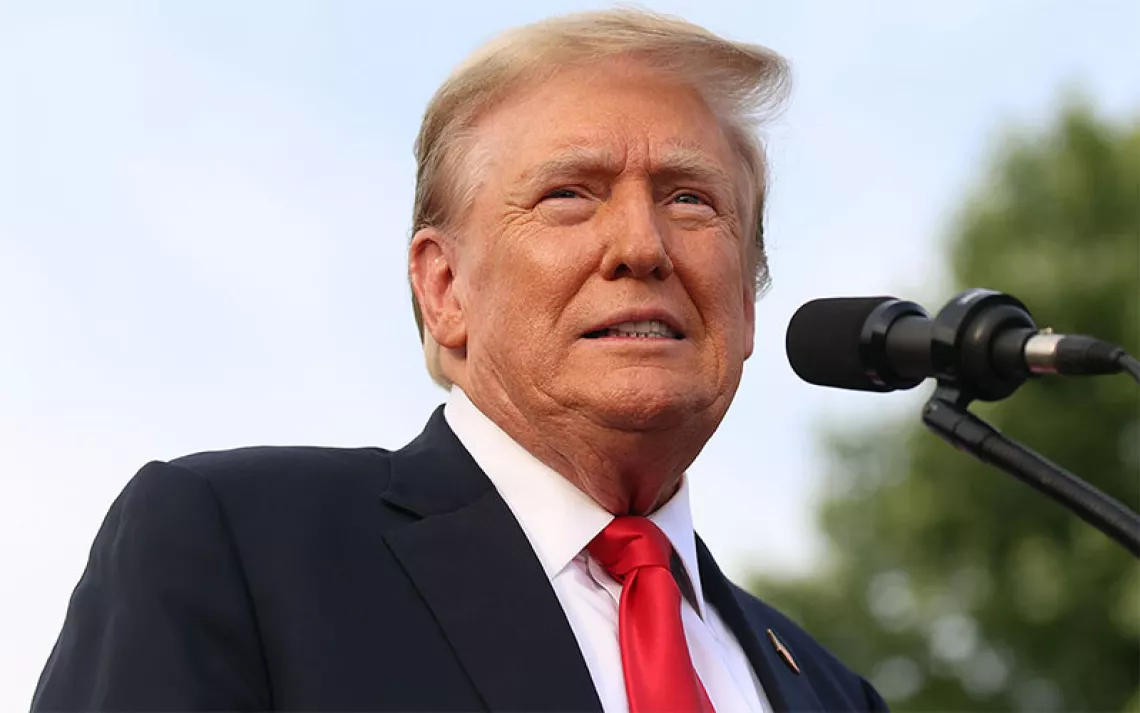John Curtis, a Utah Republican, Wants to Make Climate Change a Bipartisan Issue
But does his party care?

Representative John Curtis attends an event at the COP28 UN climate summit. | Photo by Joshua A. Bickel/AP
In late January, when Representative John Curtis kicked off his campaign for the Utah Senate seat vacated by Mitt Romney, he spoke to a crowd made up mostly of his fans. About 300 people packed into a space owned by an Orem, Utah, pest control company, and many of them had been Curtis supporters since he was elected mayor of Provo in 2010. It was a stump speech for a hometown crowd, and the Republican congressman repeatedly asked his signature question: “Can we do better?”
Curtis hit on bread and butter themes for a GOP audience, like the federal budget and energy policy. These are the sort of issues one might expect to hear about in a crowded, 11-person Republican primary for a Senate seat. But Curtis—who has a slight edge in recent polls—has also been making headlines recently as a Republican who admits that human-caused climate change is real and says he wants policies to protect the environment.
If Curtis is able to edge out the competition in the late June primary election and eventually makes it to the Senate, he would be one of the few—perhaps the only—Senate Republicans who say that climate action is a priority. In a party dominated by Donald Trump, who continues to sarcastically dismiss the threat of climate change, it would appear that Curtis is a unique political species. But the four-term congressman hopes that he can lead the party on climate, and says that he has come up with a way to talk about the issue that won’t turn off conservatives.
“We want to work together as Republicans and Democrats, because at the end of the day, we all care about leaving the earth better than we found it,” Curtis told Sierra. “That’s how I talk about it—who doesn’t want to leave the earth better than we found it?"
Curtis already has something of a climate-action track record. He advocated for climate policies during his reelection campaign in 2020 and attended the United Nations climate change conference for the past three years. In 2021, he founded the Conservative Climate Caucus, which believes that “the climate is changing, and decades of a global industrial era that has brought prosperity to the world has also contributed to that change.” With more than 80 members, it’s one of the largest caucuses in the House Republican Conference.
To some people, the growth of the caucus is evidence that there’s potential for Curtis to move the Republican Party on climate change issues. According to Karly Matthews, vice president of communications with the American Conservation Coalition—an organization of young, climate-conscious conservatives—conservatives’ negative reaction to climate laws like the Inflation Reduction Act (which not a single Republican voted for) can be traced back to a shift in language. In the past few years, environmental rhetoric morphed from “protecting the environment” to “preventing climate change.”
“Progressives took the climate issue and really championed it and had their own solutions,” Matthews says. “Rather than coming to the table and offering distinct solutions, Republicans retreated and didn’t acknowledge the issue at all, or denied it.”
Curtis may also be trying to tap into the now long lost Republican tradition of conservation leadership. Matthews pointed to the land-protection successes of Teddy Roosevelt, Ronald Reagan’s support for the Montreal Protocol, and George H.W. Bush’s amendments to the Clean Air Act. More recently, John McCain, the Arizona senator and 2008 GOP presidential candidate, was vocal about the threat of global warming and worked with Senator Joseph Lieberman of Connecticut (a Democrat turned independent) in the early 2000s to introduce a cap and trade system for greenhouse gas pollution.
Other political observers, however, are skeptical whether Curtis can move the GOP to take climate change more seriously. “I think it’s positive to bring more people to the table,” says Juliet Carlisle, a professor of political science and environment and sustainability at the University of Utah. “But the proof is in the pudding, so they say. What are your specific proposals? Are you participating in formulating policy, or are you just being an opposition to policy proposals put out by Biden and the Democrats?”
When it comes to actual votes on climate and the environment, Curtis’s record is underwhelming. He has a lifetime score of 6 percent from the League of Conservation Voters, and his environmental scorecard for the current Congress is a scant 3 percent.
Curtis’s climate policies center on clean energy and reducing emissions. But he and the Conservative Climate Caucus he created still support fossil fuels: Curtis currently represents Utah’s 3rd Congressional District, encompassing Utah counties that rely heavily on the fossil fuel industry to create jobs and power. Luis Miranda, Sierra Club of Utah chapter director, says working-class rural families in those counties—like Carbon, Emery, and Sevier—are uncertain about the future of their work in an energy economy that would shift away from fossil fuels. (“The good news is that good jobs and clean energy are not mutually exclusive,” Miranda added.)
Polling shows that Republican voters, especially young ones, support environmental protection on the whole. But support craters when the language switches to “climate change.” A 2020 poll conducted by Pew Research showed the majority of Republicans support environmental policies like planting trees, providing tax credits to businesses for the development of carbon capture, and tougher restrictions on power-plant carbon pollution. But an August NPR poll found that 70 percent of Republicans think climate change is either a minor threat or no threat at all—compared with the nearly 90 percent of Democrats who think it’s a major threat.
“I don’t think that the problem here is that conservatives don’t care about the environment, or that everyone on the right side of the aisle wants to pump the air full of CO2,” Matthews of the American Conservation Coalition says. “I think it’s more that the politics around climate drove [conservatives] away, and rather than coming up with their own solutions, they just retreated entirely.”
The American Conservation Coalition’s growth—there are now nearly 40,000 members—demonstrates that many young conservatives are committed to developing climate solutions. That’s something Curtis hopes he can leverage as a candidate in a deep red and very youthful state (Utah is the youngest state in the nation). And it appears that Curtis is finding some voter support for his climate policies.
During his campaign launch party in Orem in January, many of the young voters present said they liked that Curtis promoted environmental policies. One mentioned that he’s a skier and worries about the future of winters. But others present said climate just wasn’t a pressing issue. Kraig Thorne, a veteran, says climate would usually rank as a voting priority for him, but with “the Ukraine war, Israel, the border policy—when your house is on fire, you don’t care about the lawn as much.”
“We’re not going to get durable and sustained action at the national level on climate—a national and global challenge—if we don’t have both parties at the table,” says Josh Craft, government and corporate relations manager for the nonprofit Utah Clean Energy, which advocates for climate solutions. While the policies that Curtis and the Conservative Climate Caucus support, like enhancing carbon capture and nuclear energy technologies, likely won’t be a “major part of the solution,” Craft says, at least some Republicans now are admitting climate change is real. If Curtis wins, other Republicans nationwide might see his success as an opening to elevate their own climate change ambitions.
For now, Curtis’s messaging is willfully modest: “Leaving the earth better than we found it.” “That’s what it all comes back to—and that’s something we’re all going to agree on.”
On Tuesday, Republican voters in Utah will demonstrate whether that’s true.
This article has been updated since publication.
Paid for by the Sierra Club Voter Education Fund, which seeks to raise key environmental issues in the discussions around elections and encourage the public to find out more about candidates’ positions on key environmental issues.
 The Magazine of The Sierra Club
The Magazine of The Sierra Club



